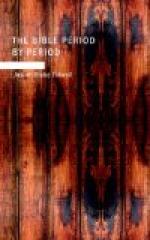From Kadesh to the Jordan. When they were refused passage through the land of the Edomites, their kinsmen, (Num. 20:14-21), the Hebrews made a long journey around. On this journey occurred three important events. (1) The death of Aaron in Mount Hor (Num. 20:22-29). (2) The defeat of the King of South Canaan and the laying waste of his country to Hormah where they had been routed nearly forty years ago. (3) The sending of the fiery serpents and the brazen serpent as a remedy. They also passed the country of Moab and came finally to the river Arnan (Num. 21:13), which is the boundary between Moab and the Amorites. Here they came into conflict with Sihon the King of the Amorites, whom they defeated, and possessed his land. (Num. 21:23-24). The overcoming of this strong and ancient people brought Israel into contact with Og, king of Bashan, who was himself a giant and whose country was far more formidable than that of the Amorites. By defeating him and possessing his cities Israel was enabled to pass on and come to the plains of Moab beyond Jordan at Jericho. In Psalms 135 and 136, written hundreds of years later, the victory over Sihon and Og and the overthrow of Pharaoh are dwelt on together in such a way as to show that their conquest was regarded as an achievement worthy to rank along side of that of their deliverance from the power of Egypt.
The Prophecies of Balaam. (Num. Chaps. 22-24). The Moabites were greatly distressed about the settlement of the victorious Hebrews in the region just north of them and feared lest they should suffer the same fate as Shihon and Og. Balak, the King of Moab, had beard of Balaam, a famous soothsayer or wise prophet of Chaldea, whose curses and blessings were reported to carry with them extraordinary effects. He sought at any cost to have him cripple Israel by placing a curse upon them. But instead of cursing Israel and blessing the Moabites, he revealed how wonderfully Israel was blessed Of God and how a scepter would rise out of Israel and smite and destroy Moab.
This strange man Balaam seems to have had the gift of prophecy without its grace. He had the knowledge of future events but sought to use it for his own advantage instead of for the glory of God. He was a covetous, money-loving prophet and sought the rewards offered by Balak. He tried repeatedly to find some way by which he could speak good for Moab and thereby earn the much desired fee. On the other hand he was afraid to speak against Israel lest the curse should recoil on him. No other word seems to describe his course except to say that he was compelled by Jehovah to speak to Israel’s advantage and to predict her future greatness. His language fittingly describes the material splendor and the splendid victories and reign of David. The spirit of Israel described is that of the united kingdom standing at the zenith of its power. In a beautiful way also he pointed to the Messiah who should put all enemies under his feet.




